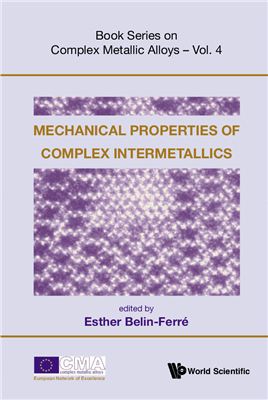World Scientific Publishing, 2011, 457 pages
This book will be the last one in a series of 4 books issued yearly as a deliverable of the research school established within the European Network of Excellence CMA (for Complex Metallic Alloys). It is written by reputed experts in the fields of metal physics, surface physics and chemistry, metallurgy and process engineering, combining expertise found inside as well as outside the network.
The CMA network focuses on the huge group of largely unknown multinary alloys and compounds formed with crystal structures based on giant unit cells containing clusters, with many tens up to more than thousand atoms per unit cell. In these phases, for many phenomena, the physical length scales are substantially smaller than the unit-cell dimension. Hence, these materials offer unique combinations of properties, which are mutually excluded in conventional materials: metallic electric conductivity combined with low thermal conductivity, combination of good light absorption with high-temperature stability, combination of high metallic hardness with reduced wetting by liquids, electrical and thermal resistance tuneable by composition variation, excellent resistance to corrosion, reduced cold-welding and adhesion, enhanced hydrogen storage capacity and light absorption, etc.
The series of books will concentrate on: development of fundamental knowledge with the aim of understanding materials phenomena, technologies associated with the production, transformation and processing of knowledge-based multifunctional materials, surface engineering, support for new materials development and new knowledge-based higher performance materials for macro-scale applications.
This book will be the last one in a series of 4 books issued yearly as a deliverable of the research school established within the European Network of Excellence CMA (for Complex Metallic Alloys). It is written by reputed experts in the fields of metal physics, surface physics and chemistry, metallurgy and process engineering, combining expertise found inside as well as outside the network.
The CMA network focuses on the huge group of largely unknown multinary alloys and compounds formed with crystal structures based on giant unit cells containing clusters, with many tens up to more than thousand atoms per unit cell. In these phases, for many phenomena, the physical length scales are substantially smaller than the unit-cell dimension. Hence, these materials offer unique combinations of properties, which are mutually excluded in conventional materials: metallic electric conductivity combined with low thermal conductivity, combination of good light absorption with high-temperature stability, combination of high metallic hardness with reduced wetting by liquids, electrical and thermal resistance tuneable by composition variation, excellent resistance to corrosion, reduced cold-welding and adhesion, enhanced hydrogen storage capacity and light absorption, etc.
The series of books will concentrate on: development of fundamental knowledge with the aim of understanding materials phenomena, technologies associated with the production, transformation and processing of knowledge-based multifunctional materials, surface engineering, support for new materials development and new knowledge-based higher performance materials for macro-scale applications.

